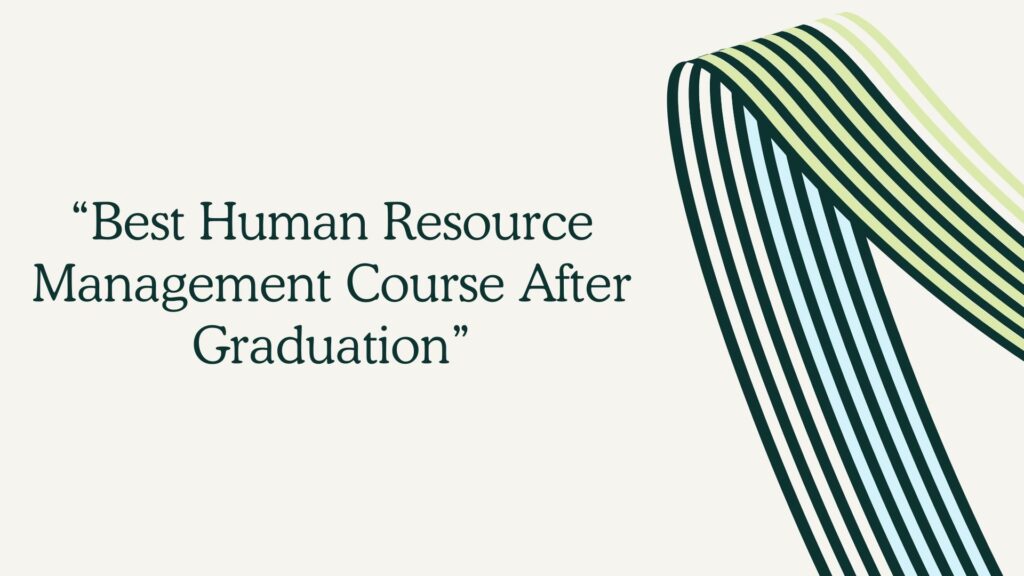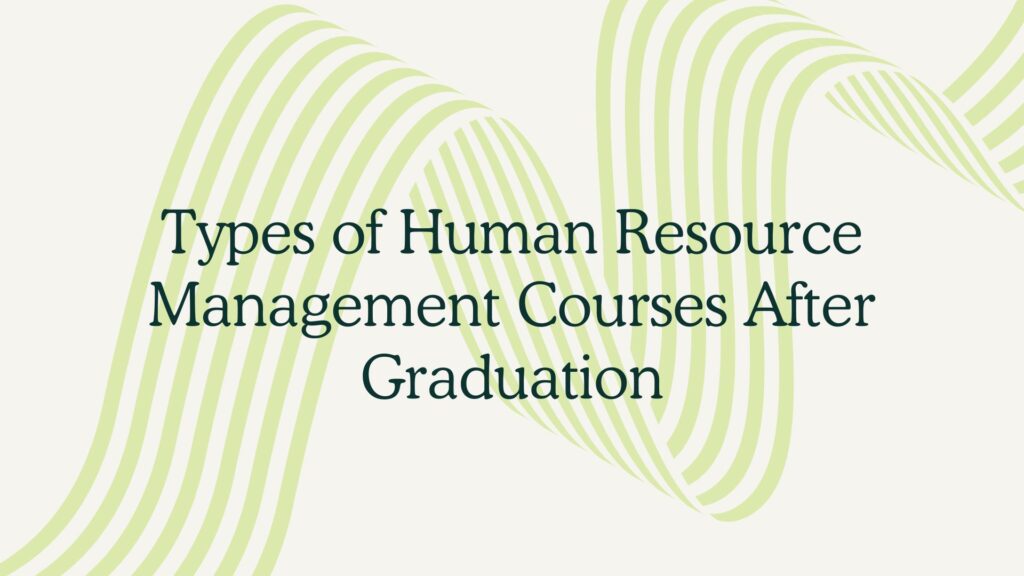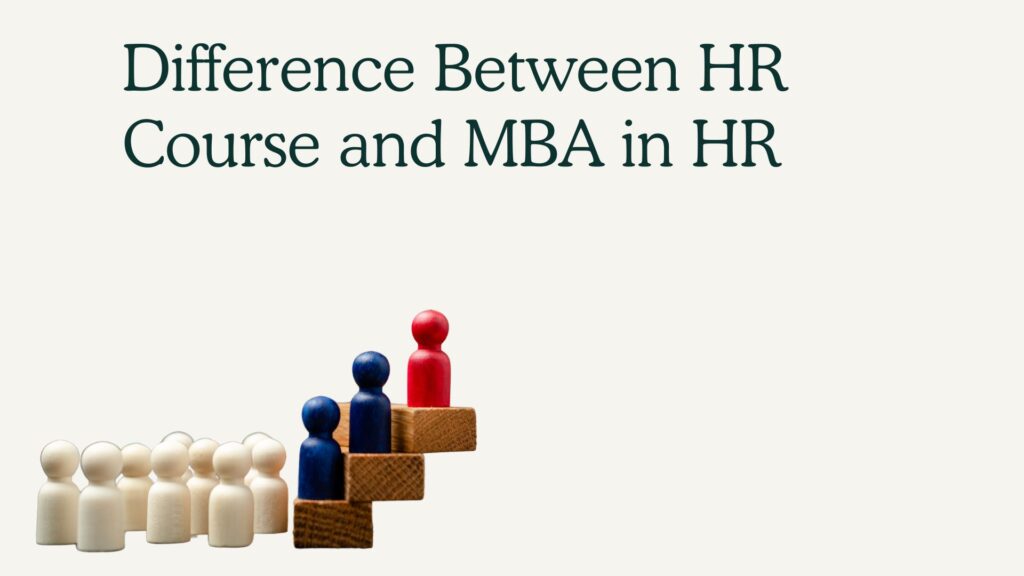“Best Human Resource Management Course After Graduation”

What is a Human Resource Management Course?
A Human Resource Management Course After Graduation is an academic or professional program designed to equip students with essential knowledge and skills in managing people within an organization. It covers a wide array of topics such as employee relations, recruitment, training and development, compensation management, labor laws, organizational behavior, and performance appraisal.
The main goal of the Human Resource Management Course After Graduation is to prepare individuals to handle HR responsibilities effectively. This includes not just administrative tasks but also strategic planning that aligns with the organization’s vision and goals.
Why Choose a Human Resource Management Course After Graduation?
After graduation, many students find themselves at a crossroads, unsure of the next step in their career journey. Opting for a human resource management course offers several benefits:
Career Versatility: HR skills are applicable across every industry.
People-Oriented Role: Perfect for those who enjoy interaction and problem-solving.
Stable Career Path: HR professionals are always in demand.
Growth Opportunities: Start as an HR executive and rise to HR Director or CHRO.
A Human Resource Management Course After Graduation after graduation helps bridge the gap between academic learning and industry practices. It empowers graduates with industry-specific knowledge and workplace competencies that increase employability.
Types of Human Resource Management Courses After Graduation

After graduation, students interested in Human Resource Management (HRM) can choose from a wide range of courses based on their career goals, time commitment, and desired specialization. Here are the types of Human Resource Management courses after graduation:
1. Post Graduate Diploma in Human Resource Management (PGDHRM)
Duration: 1 to 2 years
Eligibility: Bachelor’s degree in any stream
Focus Areas: Recruitment, compensation management, labor laws, employee engagement
Offered by: XLRI, Symbiosis, NMIMS, IGNOU (distance mode)
2. MBA in Human Resource Management
- Duration: 2 years
Eligibility: Bachelor’s degree + entrance exams (CAT, XAT, MAT, etc.)
Focus Areas: Strategic HRM, organizational behavior, industrial relations, HR analytics
Top Colleges: IIMs, XLRI, Symbiosis, TISS
3. Executive MBA / PGDM in HRM
Duration: 1 year (typically)
Eligibility: Graduation + work experience (2-5 years preferred)
Focus Areas: Advanced HR strategies, global HR practices, leadership
Best For: Working professionals aiming for leadership roles in HR
4. Certification Courses in HR
Duration: 3 months to 1 year
Eligibility: Graduation; some are open to working professionals
Popular Certifications:
SHRM-CP/SCP (Society for Human Resource Management)
HRCI (PHR/SPHR)
CHRM (Certified Human Resource Manager)
LinkedIn Learning, Coursera, Udemy, HR analytics certifications
Best For: Skill enhancement, resume building, career switchers
5. Diploma in Human Resource Management
Duration: 6 months to 1 year
Eligibility: Bachelor’s degree
Focus Areas: Recruitment, payroll, employee law basics, performance appraisal
Mode: Online/Offline/Distance
Ideal For: Fresh graduates looking to enter HR field quickly
6. M.A. in Human Resource Management / Industrial Relations
Duration: 2 years
Eligibility: Bachelor’s degree in any stream
Focus Areas: Industrial relations, HRM theories, labor economics
Best For: Academic or policy-oriented HR careers
7. Online HR Management Courses (With Placement Assistance)
Duration: 3 to 12 months
Eligibility: Graduation
Offered by: UpGrad, Simplilearn, Talentedge, Coursera + University tie-ups
Benefits: Flexible learning + placement support + global certification
8. Specialized HR Courses
- These focus on niche areas of HR:
HR Analytics
Performance Management
Organizational Development
Labor Law Compliance
Diversity & Inclusion
Talent Acquisition & Onboarding
Core Subjects in a Human Resource Management Course

1. Human Resource Management (HRM) Principles
Introduction to HR functions
Strategic HRM
Evolution and scope of HRM
2. Organizational Behavior
Individual and group behavior in organizations
Motivation theories
Organizational culture and dynamics
3. Recruitment and Selection
Job analysis and job design
Talent acquisition strategies
Interviewing and selection techniques
Onboarding process
4. Training and Development
Training needs analysis
Learning and development programs
Training effectiveness evaluation
Career planning and succession management
5. Compensation and Benefits
- Salary structure and wage theories
Incentive systems
Employee benefits management
Payroll administration
6. Labor Laws and Industrial Relations
Indian labor laws (or relevant national labor laws)
Trade unions and collective bargaining
Dispute resolution
Compliance and grievance handling
7. Human Resource Planning
Workforce forecasting
HR demand and supply analysis
Succession planning
Workforce analytics
8.Employee Engagement and Retention
Employee satisfaction and morale
Engagement models
Retention strategies
Employer branding
Skills Developed Through a Human Resource Management Course
1. Recruitment & Talent Acquisition Skills
- Crafting job descriptions
Human Resource Management Course After Graduation Screening, interviewing, and selecting candidates
Managing onboarding and orientation programs
Understanding workforce planning
2. Communication Skills
Human Resource Management Course After Graduation Effective verbal and written communication
Conflict resolution and negotiation
Public speaking and presentation abilities
Active listening and empathy
3. Performance Management Skills
Setting SMART goals and KPIs
Conducting performance appraisals
Providing constructive feedback
Coaching and mentoring
4. Training and Development Skills
Conducting training needs analysis
Designing and implementing training programs
Evaluating training effectiveness
Employee skill development planning
5. HR Analytics and Data Interpretation
Understanding HR metrics (e.g., attrition rate, time-to-hire)
Using tools like Excel, Power BI, or Tableau
Interpreting workforce trends
Making data-driven decisions
6. Leadership and Team Management
Team building and motivation
Delegating responsibilities
Conflict mediation
Leading change in organizations
Top Institutes Offering Human Resource Management Course After Graduation in Navi Mumbai
1. ITM Business School, Kharghar
- Course: PGDM in Human Resource Management
Duration: 2 years (Full-time)
Approvals: AICTE-approved
Highlights: Strong industry connections, summer internships, corporate training programs
2. SIES College of Management Studies, Nerul
Course: PGDM in Human Resource Management
Duration: 2 years
Entrance Exam: CAT / MAT / CMAT / XAT / ATMA
Highlights: Excellent placement records, industry-based learning
3. DY Patil University, School of Management, Nerul
Course: MBA in Human Resource Management
Duration: 2 years
Approvals: UGC-recognized
Highlights: Offers live projects, workshops, and modern HR labs
4. Oriental College of Commerce and Management, Vashi
- Course: BMS (Bachelor of Management Studies) with HR specialization
Duration: 3 years (Undergraduate)
Affiliated To: University of Mumbai
Highlights: Ideal for 12th pass students aiming for HR careers
5. National Institute of Management & Business Studies (NIMBS), Navi Mumbai
- Course: Diploma & Certification in HR Management
Mode: Online / Distance / Classroom
Highlights: Short-term and flexible options, suitable for working professionals
6. IIHR – Institute of International Human Resource, Navi Mumbai
- Course: HR Certification Courses (CHRM, CHRP)
Duration: 3 to 6 months
Mode: Online and offline
Highlights: Specialized HR training with international certification and placement support
Admission Requirements in Human Resource Management Course
1. Undergraduate Courses (e.g., BBA/BMS in HR)
- Eligibility Criteria:
Completion of 10+2 (HSC) from a recognized board (any stream)
Minimum 50% marks (may vary by institute)
Some colleges may conduct entrance tests or interviews
Documents Required:
10th & 12th mark sheets
Transfer Certificate (TC)
Passport-size photos
ID proof (Aadhar/PAN)
Caste certificate (if applicable)
2. Postgraduate Courses (MBA/PGDM in HRM)
Eligibility Criteria:
A bachelor’s degree in any discipline (minimum 50% marks)
Appeared/passed in entrance exams such as:
CAT, MAT, XAT, CMAT, ATMA, NMAT, or institute-specific test
Group Discussion (GD) and Personal Interview (PI) rounds (varies by institute)
Documents Required:
Graduation marksheets and degree certificate
Entrance exam scorecard
Resume (often required during interview)
10th & 12th certificates
Passport-size photos
Caste and domicile certificate (if applicable)
3. Diploma & Certification Courses in HR (Short-Term)
Eligibility Criteria:
12th pass or graduate in any stream
Working professionals preferred (for executive programs)
No entrance exams generally required
Documents Required:
Academic mark sheets
ID proof
Work experience certificate (for executive HR programs, optional)
Recent passport-size photos
4. Online / Distance HRM Programs
(Offered by platforms like IIHR, IIBM, or UpGrad)
Eligibility Criteria:
Varies by course level: 12th pass or graduate
No entrance exams
Internet access and computer literacy
Documents Required:
ID proof
Email ID and mobile number
Academic documents (for verification only)
Optional: Work experience documents
Duration of Human Resource Management Course After Graduation
The duration of the human resource management course after graduation depends on the type of program chosen. Here’s a breakdown:
| Course Type | Typical Duration |
|---|---|
| MBA/PGDM in HRM | 2 Years (Full-time) |
| Executive MBA in HRM | 1 Year |
| Diploma in Human Resource Management | 6 Months to 1 Year |
| Certificate Course in HRM | 1 Month to 6 Months |
| Online/Distance Learning HRM | Flexible (3 Months to 1 Year) |
Fees for Human Resource Management Course After Graduation
The fees for human resource management course after graduation vary based on the institute, course level, and learning format (online, offline, part-time).
| Course Type | Fee Range (Approximate) |
|---|---|
| MBA/PGDM in HRM (Top Institutes) | ₹3,00,000 – ₹10,00,000 |
| Executive MBA in HRM | ₹1,00,000 – ₹4,00,000 |
| Diploma in HRM | ₹30,000 – ₹1,00,000 |
| Certificate Course in HRM | ₹5,000 – ₹50,000 |
| Online/Distance HRM Course | ₹10,000 – ₹70,000 |
Difference Between HR Course and MBA in HR

| Feature | HR Course (Certification/Diploma) | MBA in HR |
|---|---|---|
| Duration | Short duration – typically 1 to 12 months. Perfect for those seeking quick entry into HR roles. | 2 years full-time postgraduate program. |
| Cost | Affordable – fees range from ₹5,000 to ₹1,00,000, suitable for all budgets. | Higher cost – usually ₹3,00,000 to ₹10,00,000 depending on the institute. |
| Learning Format | Available in online, offline, or weekend formats – flexible for working professionals. | Requires full-time commitment, limited flexibility. |
| Eligibility | Any graduate can apply; no entrance exams needed in most cases. | Requires graduation and qualifying entrance exams like CAT, MAT, etc. |
| Focus Area | Practical and skill-based – focuses on core HR functions like payroll, recruitment, etc. | Strategic and theoretical – includes business, law, analytics, etc. |
| Career Outcomes | Prepares you for roles like HR Assistant, Recruiter, HR Executive quickly. | Suited for roles like HR Manager, Business Partner, HR Consultant. |
| Time to Get a Job | Faster employability – job-ready within a few months. | Longer path to employment – usually after completing 2 years. |
| Best For | Ideal for graduates or professionals who want a quick start in HR. | Best for freshers looking for long-term HR leadership roles. |
| Placement Support | Some institutes offer placement assistance for HR courses. | Strong placement cells, especially in top B-schools. |
| Flexibility | Highly flexible – fits around jobs, internships, or other commitments. | Fixed schedule and classes – less flexible. |


